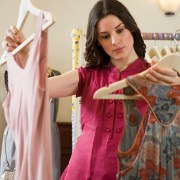 Photo: Getty Images
Photo: Getty Images
If you’ve picked up any fashion or beauty magazine in the past 10 years, you would have stumbled upon articles about dressing for your body type. There is a strategy and an art to making certain clothes look best on different people, but it’s not always easy to spot the right items for your body type when you’re out and about.
And while the Journal of Consumer Research hasn’t crafted the ultimate shopper’s guide to "dressing for your body type", they have unearthed evidence as to how not to get you to buy certain clothing.
In an article to be printed in February 2012, the Journal of Consumer Research found that people who don’t feel positive about their appearance are less likely to buy an item they’re trying on if they see a good-looking shopper or salesperson wearing the same thing.
Seeing a good-looking person wearing an item you want can dissuade a shopper with low self-esteem and on some subconscious level let you know that item is not best for your body type. Or if nothing else, sends you a message that it’s better suited for the attractive person’s body type.
The researchers say that this phenomenon only occurs when both an attractive shopper and the shopper with low self-esteem are trying on the clothing at the same time. The shopper with the low self-esteem sees how good the attractive person looks in the clothing and the difference between how the two look is magnified. Ultimately, the low self-esteemed shopper puts the clothing back on the rack and leaves the store.
For their experiment, researchers asked female participants to go into a retail store and try on a certain shirt. An employee inside, in cahoots with the researchers, showed some participants an attractive shopper already wearing the same shirt, as if by coincidence.
After trying on the shirt, the shoppers were asked to fill out surveys evaluating the clothing and their own body esteem. Those with low self-esteem rated the product significantly lower if they had encountered the pretty shopper wearing the same item.
The effect was not as profound when workers at the store or consumer models wore the clothing. The most obvious effect occurred when an attractive shopper tried on the clothing at the same time as the low self-esteem shopper.
The researchers note that people are constantly looking for points of comparison to shape our self-image, and that because people with low self-esteem are often made to feel worse by such comparisons, they will try to protect themselves by avoiding purchasing the item.
So the next time you go shopping, keep in mind that we all do have different body types and that what’s important is that you find clothes that you feel good in and that highlight your body. Even if the attractive shopper in the next dressing room over looks good in an item, that’s not to say you don’t look great in it, too.
Sources:
Consumer Self-Esteem While Shopping: Maybe Good-Looking Clerks
Shouldn’t Wear the Store Brands. Journal of Consumer Research. Web. 17 Aug. 2011.
http://www.jcr-admin.org/files/pressreleases/080911125136_Dahlrelease.pdf
How Attractive Clothes Shoppers Affect Our Buying Habits. TIME. Web. 16 Aug. 2011.
http://moneyland.time.com/2011/08/16/how-attractive-clothes-shoppers-affect-our-buying-habits
Reviewed August 17, 2011
by Michele Blacksberg R.N.
Edited by Jody Smith
Bailey Mosier is a freelance journalist living in Orlando, Florida. She received a Masters of Journalism from Arizona State University, played D-I golf, has been editor of a Scottsdale-based golf magazine and currently contributes to GolfChannel.com. She aims to live an active, healthy lifestyle full of sunshine and smiles.





Add a CommentComments
There are no comments yet. Be the first one and get the conversation started!